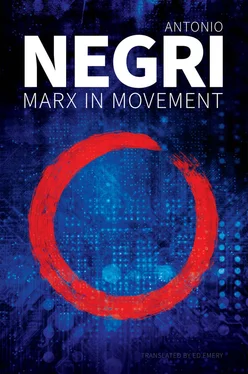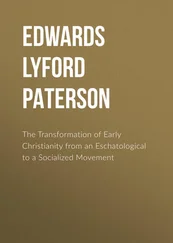But let me be more precise about what I mean when I say that social labour power is understood as mobility. I mean that labour power is understood as social, mobile and subjectively capable of identity. I mean that capital understands as a present reality what, for the mass workers weighed down by the contradictions implicit in their own social gestation, was present purely as tendency. And above all I mean a substantial modification in the level at which we consider the problem.
Mobility is time, flow and circulation within time. Marxism bases its categories on the time measure of the working day. In certain wellknown Marxist texts, the convention of time measure becomes so solid and unquestioned as to postulate as its base a working day that is ‘normal’. Now, in our present situation, of all this there remains no trace. The time of social labour power is a working day so extended as not only to comprise within itself the relation between production time and reproduction time, as a single whole, but above all to extend the consideration of time over the entire life space of the labour market. From the working day to the labour market, from working hours to the mobility of labour, this transition means counterposing two opposing conceptions of time: the capitalist conception of time measure and the conception of working-class freedom over the temporal span of life. The capitalist operation of reducing lifetime to an abstract labour time measure becomes an operation that is absolutely antagonistic. In its conception of time and development, it reveals a substantial dissymmetry with proletarian life, with the very existence of social labour power. Here we can say that the dissymmetry of command in general (the dissymmetry revealed by theories of the state), and in particular the dissymmetry that regulates the categories of exploitation, become dislocated and reshaped in the face of the long social time of proletarian existence.
In arguing my case, I want to stress this point. The reason is clear. If it is true that the terms of exploitation are now relocated on the social terrain and if, within this social terrain, it is no longer possible to reduce quantity and quality of exploitation, absolute surplus value and relative surplus value, to the time measure of a ‘normal’ working day – then the proletarian subject is reborn in antagonistic terms, around a radical alternative, an alternative of life time as against the time measure of capital. But, even if we limit our arguments to a critique of the political economy of the mass worker, we are still able to achieve positive results on this question – namely that the ambiguous concept of the mass worker here reveals its structural indeterminacy and instability: its ambiguity is that between a system of domination still internalized by the mass worker (capital’s time measure) and a perspective on work that is calculated and envisaged over the time of an entire life. Mass workers are still prey to ideology – their memory is of slavery, while their actions speak of freedom. Capitalist restructuring, which anticipates and outmanoeuvres the struggles of the mass worker by introducing the dimension of social labour power, at this point arrives at a definitive contradiction, inasmuch as any transcendence of the mass worker has to be, not a reproduction and reformulation of domination over socialized labour power, but a resolution of the contradictory tensions within the figure of the mass worker and the structural realization of the antagonism in a new form.
The social worker: let us define the way the antagonism has become subjectivized at this level, and call socialized labour power ‘the social worker’. In this way we are clearly introducing a specific methodological difference – in any event a position that differs from those developed in earlier phases of the theory of the mass worker and in the methodology that was considered adequate for the maturation of that theory. The specificity and the difference lie in the quality of the antagonism that appears at this point. In other words this abstract, social and mobile labour power – to the extent that it subjectivizes itself around its own concept of time and a temporal constitution of its own (which are irreducible to the time measurement of capitalist command) – brings about an irreducible antagonism : irreducible not only to labour power, conceived of as variable capital, and to the theoretical dialectic of value, all of which is perfectly obvious, but above all irreducible to the far more refined dialectic of composition, restructuring and recomposition that, from a class point of view, had been developed as a portrayal integral to the historical experience of the mass worker. In reality this portrayal, in its further versions, maintained a concept of the working day that was modelled on the capitalist conception of a time measure. But when the whole of life becomes production, capitalist time measures only that which it directly commands. And socialized labour power tends to unloose itself from command, insofar as it proposes a life alternative – and thus projects a different time for its own existence, both in the present and in the future. When all life time becomes production time, who measures whom? The two conceptions of time and life come into direct conflict, in a separation that becomes increasingly deep and rigidly structured. But we shall come to all this in the next section.
Let’s now return to our critique of the political economy of the mass worker. At the cost of repeating myself, I must stress once again both the importance and the ambiguity of that category. Its importance lies in the fact that, with the historical emergence of the mass worker, the concept of labour power removes itself definitively from the theory-imposed destiny of being a component – albeit variable – of capital. But in the act of revealing itself as an independent variable (and clashing with a capitalist restructuring that relentlessly tracks, adjusts and recomposes the struggles), the constitutive activity of the mass worker, even though moving in a situation of complete socialization of production, failed to reach a sufficient degree of maturity. This brought about powerful ambiguities, and also, in the 1970s, a degree of political retrogression: a corporatism of certain strata of the mass worker, new divisions within the class, and so on. But this is the point where the character of the social worker emerges as a new force and as a subjective qualification of social labour power. The social worker completed and concluded the dynamic that existed within the mass worker as a tendency, and transformed the independent variable into independence tout court. This antagonism develops at a pace dictated by the rhythms of the real subsumption, which capital puts into operation in relation to social labour. As real subsumption advances, so the social worker is brought into existence, as irresolvable antagonism: antagonism as regards conceptions of life, the liberation of time, and thus in bringing about spatial–temporal conditions that are wholly alternative. It is a sort of a priori of liberation.
But before I resume this line of argument, allow me to point out an apparent paradox in the theory – which in this case turns out to be a function of mystification. In the so-called postmodern (or postcapitalist) conceptions that are so current in political debate today, the process of subsumption is represented in terms of linearity and catastrophe. In some instances, these terms can also be found in Marx – and, in far more developed form and sometimes completely explicitly, in the socialist vulgate. Subsumption is given as a system, as labour power realized within capital’s social domination, as a levelling-off of the antagonism – and therefore the antagonism is conceived of as a utopian and catastrophist alternative. Such positions are fairly widespread and sometimes also include exponents of the mass worker theory. In these workerist theories that are flirting with theories of postmodernism (stressing tendency and objectivity and eliminating antagonism and subjectivity), some would say that workerism is committing hara-kiri. The paradox and, at the same time, the mystification consist in the fact that here Marx’s thinking (with the considerable tensions that run through it right up to the point where he defines real subsumption – whether in the unpublished Chapter VI or, a good while previously, in the ‘Fragment on Machines’ in the Grundrisse , texts that must be seen as complementary) appears to be respected, whereas in fact it is deeply and irreparably misrepresented. In fact the focus in Marx is always the actuality and the determinacy of the antagonism. It is indeed true that the theoretical tendency of capital, which Marx also describes (but only episodically, and, as I have said, in terms rather subordinated to the antagonistic spirit of his overall argument), on occasion accepts this criticism and fights shy of the more banal mystifications. Nevertheless, when pushed to the limit, the most we can get from this conception of antagonism is to see it in an exogenous form: catastrophe. But our task, in going beyond Marx, is to grasp the antagonism in its endogenous form , also at the level of real subsumption.
Читать дальше












